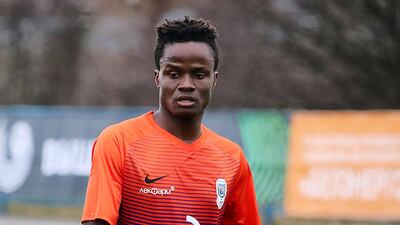Leadership in the time of pandemic takes many forms. In Liberia, west Africa, the president released a song to urge social distancing and safe conduct among his five million citizens. But then George Weah, who won football's Ballon d’Or some 20 years before he was elected head of state, has always had the gift of performance.
In Belarus, eastern Europe, Alexander Lukashenko, president for a quarter of a century, does things a different way. He has been drawing attention to his country for his bullish opinions on how to combat Covid-19, telling compatriots to live life much as they usually do, and just eat more garlic. Most conspicuously, Belarus is the only European nation where professional football continues, an outlier in sport's global closedown, and a situation that has gained the Vysheyshaya, the Belarus Premier League, an expanded following via television from international viewers starved of other live sport.
For David Tweh, one of the rising stars of the Vysheyshaya, the contrast between the Weah message and the Lukashenko logic is especially striking. He is a 21-year-old Liberian international midfielder with the Minsk club Energetik-BGU - and he keeps hearing the same question.
“People ask ‘How are you guys still playing?’,” he reports. “Every time we speak on the phone my mum says ‘Are you sure you’re safe?’ And I say 'yes, everything is cool'.” Then he asks his mother, Christiana, about her own safety. As a Liberian, they both know only too well the devastating impact of epidemics, and the stresses of long-term lockdowns.
Tweh remembers the last one vividly. It was imposed after the Ebola virus struck Liberia, Guinea and Sierra Leone in late 2013. He was a teenager intent on a career in football but put a pause on his ambitions because of the restrictions placed on all social interaction to contain the spread of the disease.
“We had to stay home, there was no going out for a period,” he recalls. “It was very difficult for Liberians at that time.”
___________________
More than 1,000 fans attend football match in Belarus
___________________
The World Health Organisation lifted the Ebola state of emergency in 2016, and Tweh set off on the journey talented footballers from his part of west Africa have been following since Weah, AC Milan's 1995 Ballon d'Or, became Liberia’s greatest sporting pioneer: the journey to a club contract in Europe. Belarus’s top division may not be Serie A, but it is frequently a springboard to more prestigious leagues, and Tweh, recognised by his peers as the Vysheshaya’s best young midfielder last season, intends it to be just that.
The sudden visibility of Belarus club football, he admits, may help to raise his profile, especially as Energetik were at the top of table earlier this month. Broadcasting rights to the league have been obtained by various European countries looking for live sport for emptied schedules. “We are aware that more people are watching,” says Tweh, “but it feels somehow weird because actually inside the stadiums there are not as many spectators as usual”.
That is proof the Belarus Football Association’s decision to keep the season going is not universally backed by fans. As for the international players union, Fifpro, it has condemned the Belarus authorities for putting players at risk, in a country where, according to John Hopkins University, the number of reported cases of Covid-19 had reached 9,500 this weekend.
For the footballers of the Vysheshaya, there is no strict regime for testing for coronavirus, just, according to Tweh “preventive measures like washing hands and hand sanitiser in the dressing-room. We must just cope with the situation. There was a discussion with the league about whether to close down, but I think it will continue.”
Tweh admits he is not always focused on local news about the pandemic. “You give it attention, and you start to worry.”
His greater concern is for loved-ones in west Africa, where the reported rates of infection are currently lower than in most of Europe, but where the capacity of health services to respond to widespread contagion seems more fragile. Tweh fears the Covid-19 pandemic could be more damaging to Liberia even than the Ebola outbreak, which claimed over 11,000 lives.
“Some people say we in Liberia are better prepared for this virus because of our experiences back then. But I would say probably we are not. This time it is a worldwide pandemic, as opposed to just Africa. During the Ebola crisis, we had international support. People are afraid now that the support from outside is not going to happen.”

















